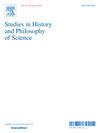证据之体:兴奋性谵妄综合征 "与死因调查的认识论
IF 1.4
2区 哲学
Q1 HISTORY & PHILOSOPHY OF SCIENCE
引用次数: 0
摘要
"兴奋性谵妄综合征"(ExDS)是一种有争议的诊断。这种所谓的综合征有时被认为是潜在的死亡原因。然而,也有人认为,其唯一目的是掩盖警方的过度暴力,因为它主要用于解释被拘留者的死亡。在本文中,我们通过讨论法医学中的因果假设、证据和数据之间的关系,研究了引起这一有争议的诊断的认识论条件。我们认为,从业人员的社会背景通过在多个阶段进入调查的背景假设影响了因果调查。这一分析有助于更好地理解 ExDS 争议诊断的广泛使用。本文章由计算机程序翻译,如有差异,请以英文原文为准。
Bodies of evidence: The ‘Excited Delirium Syndrome’ and the epistemology of cause-of-death inquiry
“Excited Delirium Syndrome” (ExDS) is a controversial diagnosis. The supposed syndrome is sometimes considered to be a potential cause of death. However, it has been argued that its sole purpose is to cover up excessive police violence because it is mainly used to explain deaths of individuals in custody. In this paper, we examine the epistemic conditions giving rise to the controversial diagnosis by discussing the relation between causal hypotheses, evidence, and data in forensic medicine. We argue that the practitioners’ social context affects causal inquiry through background assumptions that enter inquiry at multiple stages. This analysis serves to better understand the wide usage of the controversial diagnosis of ExDS.
求助全文
通过发布文献求助,成功后即可免费获取论文全文。
去求助
来源期刊

Studies in History and Philosophy of Science
管理科学-科学史与科学哲学
CiteScore
2.50
自引率
10.00%
发文量
166
审稿时长
6.6 weeks
期刊介绍:
Studies in History and Philosophy of Science is devoted to the integrated study of the history, philosophy and sociology of the sciences. The editors encourage contributions both in the long-established areas of the history of the sciences and the philosophy of the sciences and in the topical areas of historiography of the sciences, the sciences in relation to gender, culture and society and the sciences in relation to arts. The Journal is international in scope and content and publishes papers from a wide range of countries and cultural traditions.
 求助内容:
求助内容: 应助结果提醒方式:
应助结果提醒方式:


